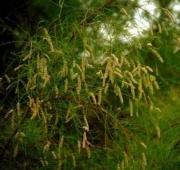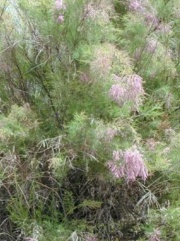Tamarisk gall
Description
An abnormal growth on tamarisk trees, Tamarix orientalis, Tamarix articulata or Tamarix tetragyna, that are native to arid regions in Morocco, Middle East, and India. Tamarisk galls are formed when gall-wasp eggs are deposited on tree branches. The nutlike gall grows until the larvae are completely enveloped. The mature insect bores a hole through the gall in order to escape. Tamarisk galls and tamarisk bark contain about 10% tannins, such as gallic and ellagic acids along with juglanin and dihydrojuglon-5-glucoside. The tannins have been used for centuries for vegetable tanning of leather. The tamarisk trees were introduced into the U.S. in the 1800s and are now considered an invasive species.
Synonyms and Related Terms
tamarix; saltcedar; Tamarix orientalis; Tamarix articulata; Tamarix tetragyna; taray (Esp.)
Sources Checked for Data in Record
- G.S.Brady, Materials Handbook, McGraw-Hill Book Co., New York, 1971
- Ralph Mayer, A Dictionary of Art Terms and Techniques, Harper and Row Publishers, New York, 1969 (also 1945 printing)
- Hermann Kuhn, Conservation and Restoration of Works of Art and Antiquities, Butterworths, London, 1986
- Matt Roberts, Don Etherington, Bookbinding and the Conservation of Books: a Dictionary of Descriptive Terminology, U.S. Government Printing Office, Washington DC, 1982
- Wikipedia, the free encyclopedia, at http://www.wikipedia.com Comment: http://en.wikipedia.org/wiki/Tamarisk (Accessed Sept. 28, 2005)

